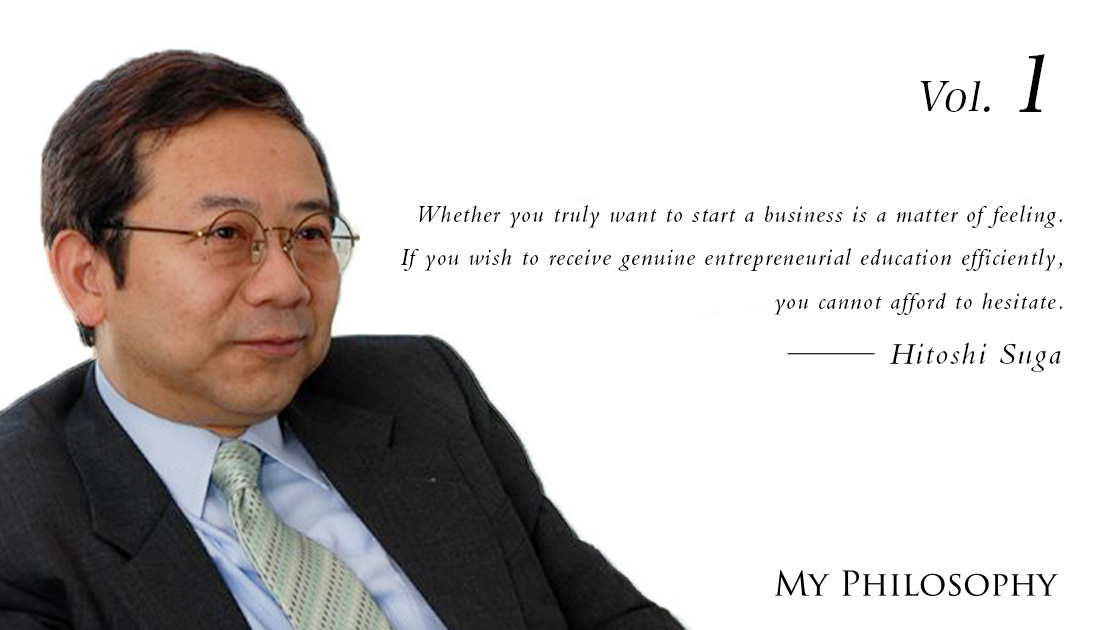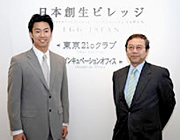
As a venture capitalist known for discovering leading domestic venture companies, including Tully's Coffee Japan, Mr. Hitoshi Suga has a track record of uncovering prominent startups. We asked him about the mindset necessary for establishing and managing a company.
Profile
Vol.1 Hitoshi Suga
Venture Capitalist
Over the course of several years, Hitoshi Suga held prominent roles in M&A and venture capital operations at Mitsui & Co. In 1996, he assumed the position of the inaugural President and CEO of M.V.C. Corporation, a venture capital firm affiliated with the Mitsui Group. Notably, he spearheaded the discovery and nurturing of Tully's Coffee Japan Co., Ltd. (now FoodX Globe Co., Ltd.) from its inception, guiding its investment and growth strategies.
Under his leadership, the company achieved a remarkable listing on the Nasdaq-J market (now the Hercules market) within a record time of two and a half years, marking a significant milestone in the food service industry. Suga currently serves as Vice Chairman of the Board of Directors, overseeing the company's evolution into a 14 billion yen enterprise. Following his departure from Mitsui & Co. and M.V.C. Corporation in 2000, he held various executive positions, including serving as a representative in Japan for foreign financial institutions and investment companies.
Presently, Suga holds directorial positions at FoodX Globe Co., Ltd., Global Insurance Co., Ltd., and Ov Corporation, while also serving as an auditor at Visioneer Co., Ltd., among other ventures. Additionally, since 2005, he has been an esteemed member of the Akita Prefecture Comprehensive Development Deliberation Council and has served as a visiting professor in the Global Business Program at International University of Akita since 2006.
Marunouchi Entrepreneurial School
 At the Marunouchi Entrepreneurial School, where I serve as head, the majority of attendees are current employees of major corporations or government agencies nearby, predominantly in their mid-30s. Due to the location and a schedule that suits their availability—classes from 7 p.m., a 10-session course costing 150,000 yen—we attract a very conscious and intelligent group of people.
About 30% of them are sent by their companies, but most are paying out of their own pockets. Some even attend secretly without informing their company or office. Among the attendees are doctors, certified public accountants, and lawyers who have just opened their clinics and offices and want to learn management techniques. When the school first opened, if I asked, “Are you thinking of quitting your job to start a business right now?” only about 3 out of 20 participants, including those self-employed, would raise their hands. But recently, about half of them would. The nature of large corporations is significantly changing, and even those who are currently doing well in such organizations are seriously considering independence, thinking about the future.
Since these individuals are staking their lives on this venture, I respond with equal seriousness. I listen to the knowledge and opinions from various industries, assess the limits and extents of risks, and if I believe someone has the potential, I encourage them. However, there are also those whom I think should not leave their current jobs for various reasons. While I wish everyone could leave their jobs to start new ventures, I am aware that their livelihoods are at stake, and I cannot advise them carelessly.
At the Marunouchi Entrepreneurial School, where I serve as head, the majority of attendees are current employees of major corporations or government agencies nearby, predominantly in their mid-30s. Due to the location and a schedule that suits their availability—classes from 7 p.m., a 10-session course costing 150,000 yen—we attract a very conscious and intelligent group of people.
About 30% of them are sent by their companies, but most are paying out of their own pockets. Some even attend secretly without informing their company or office. Among the attendees are doctors, certified public accountants, and lawyers who have just opened their clinics and offices and want to learn management techniques. When the school first opened, if I asked, “Are you thinking of quitting your job to start a business right now?” only about 3 out of 20 participants, including those self-employed, would raise their hands. But recently, about half of them would. The nature of large corporations is significantly changing, and even those who are currently doing well in such organizations are seriously considering independence, thinking about the future.
Since these individuals are staking their lives on this venture, I respond with equal seriousness. I listen to the knowledge and opinions from various industries, assess the limits and extents of risks, and if I believe someone has the potential, I encourage them. However, there are also those whom I think should not leave their current jobs for various reasons. While I wish everyone could leave their jobs to start new ventures, I am aware that their livelihoods are at stake, and I cannot advise them carelessly.
Essentials for Entrepreneurs
 I have always maintained that “It is absolutely unacceptable for a company to operate solely on the principle that profit is all that matters.” A business is a societal entity. It is crucial to evaluate whether it serves a purpose for the society because customer support for services and products leads to increased sales and business prosperity. However, any operation that does not benefit society, or worse, deceives people for money, is doomed to fail, even if it may seem profitable in the short term. The question really is whether there is a vision. When you’re willing to advance your business, even at personal sacrifice, profits will naturally follow. Earning money can be seen fundamentally as a vote from society – a reflection of how much you’ve sold and how much support you’ve garnered. Providing good products or services, especially if it’s a novel venture, will garner significant societal support and ultimately lead to sales and profits.
I have always maintained that “It is absolutely unacceptable for a company to operate solely on the principle that profit is all that matters.” A business is a societal entity. It is crucial to evaluate whether it serves a purpose for the society because customer support for services and products leads to increased sales and business prosperity. However, any operation that does not benefit society, or worse, deceives people for money, is doomed to fail, even if it may seem profitable in the short term. The question really is whether there is a vision. When you’re willing to advance your business, even at personal sacrifice, profits will naturally follow. Earning money can be seen fundamentally as a vote from society – a reflection of how much you’ve sold and how much support you’ve garnered. Providing good products or services, especially if it’s a novel venture, will garner significant societal support and ultimately lead to sales and profits.
Participating in Entrepreneurship
The Importance of a Corporate Mission
 Without a thorough understanding of one’s own company, it becomes impossible to compare with others and achieve differentiation. This is where the concept of a corporate identity and mission becomes crucial. A corporate mission clarifies how a company intends to interact with society and what its objectives are in terms of contributing to specific sectors. Companies with a solid mission tend to thrive, while those without it usually do not last.
In the United States, the corporate mission is valued across businesses, and companies that adhere to their missions remain stable even as the world becomes more complex. A mission that wavers can strangely lead a company astray. This is especially true for ventures that differentiate themselves in specific areas not addressed by others. A core mission must permeate through to employees and customers alike for a company to be profitable.
Without a thorough understanding of one’s own company, it becomes impossible to compare with others and achieve differentiation. This is where the concept of a corporate identity and mission becomes crucial. A corporate mission clarifies how a company intends to interact with society and what its objectives are in terms of contributing to specific sectors. Companies with a solid mission tend to thrive, while those without it usually do not last.
In the United States, the corporate mission is valued across businesses, and companies that adhere to their missions remain stable even as the world becomes more complex. A mission that wavers can strangely lead a company astray. This is especially true for ventures that differentiate themselves in specific areas not addressed by others. A core mission must permeate through to employees and customers alike for a company to be profitable.
What Motivates People
 I served as the president of MVC Venture Capital for four years, investing in newly established companies. While having a good business model or a niche is important, the fundamental attraction often lies in the individual’s earnestness and extraordinary passion. There are plenty of interesting things in the world, but when someone leaves a large corporation to pursue their venture desperately, you feel compelled to help them succeed. That’s how a support network is formed around them.
Among our students, some may not have a perfect business plan, but their determination to “put their lives on the line” for their venture is evident. If we judge the challenge as difficult but not impossible, we feel inclined to “invest money,” “take on the responsibility as an executive,” and “introduce other investors.”
Supporting means sharing the risk with everyone involved in the venture. Therefore, it’s crucial that the entrepreneur emits an incredible passion and energy, almost like an aura, that draws others into sharing that risk. The world works in fascinating ways; when someone is in trouble, there’s always someone else willing to help. There are people who offer money silently, saying there’s no need to repay until the venture is profitable. The reason is always “because I like that person.” Having observed many companies, I’ve noticed that successful ones always have such stories behind them.
I served as the president of MVC Venture Capital for four years, investing in newly established companies. While having a good business model or a niche is important, the fundamental attraction often lies in the individual’s earnestness and extraordinary passion. There are plenty of interesting things in the world, but when someone leaves a large corporation to pursue their venture desperately, you feel compelled to help them succeed. That’s how a support network is formed around them.
Among our students, some may not have a perfect business plan, but their determination to “put their lives on the line” for their venture is evident. If we judge the challenge as difficult but not impossible, we feel inclined to “invest money,” “take on the responsibility as an executive,” and “introduce other investors.”
Supporting means sharing the risk with everyone involved in the venture. Therefore, it’s crucial that the entrepreneur emits an incredible passion and energy, almost like an aura, that draws others into sharing that risk. The world works in fascinating ways; when someone is in trouble, there’s always someone else willing to help. There are people who offer money silently, saying there’s no need to repay until the venture is profitable. The reason is always “because I like that person.” Having observed many companies, I’ve noticed that successful ones always have such stories behind them.
 By starting Kendo in New York, I was able to immerse myself in Japanese culture and etiquette despite being abroad.“The sword is the mind. When the mind is right, the sword is right. When the mind is not right, the sword is also not right. He, who wishes to study kendo, must first study his mind.” I always keep this philosophy in mind and act accordingly. Through the passionate interview with Mr. Suga, I was reminded that in business, as in Kendo, the heart, the mindset of entrepreneurs and managers, is the most crucial element in company management.
By starting Kendo in New York, I was able to immerse myself in Japanese culture and etiquette despite being abroad.“The sword is the mind. When the mind is right, the sword is right. When the mind is not right, the sword is also not right. He, who wishes to study kendo, must first study his mind.” I always keep this philosophy in mind and act accordingly. Through the passionate interview with Mr. Suga, I was reminded that in business, as in Kendo, the heart, the mindset of entrepreneurs and managers, is the most crucial element in company management.
At the Shin Marunouchi Building “Tokyo 21c Club”, May 2007.






























































































































